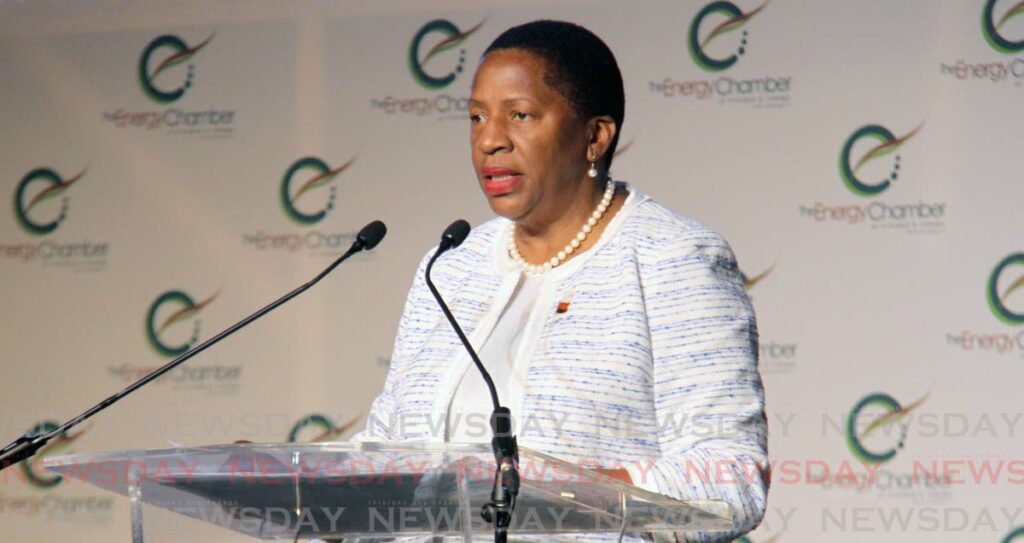Planning Minister: Government will bring new data laws to protect citizens

Minister of Planning and Development Pennelope Beckles says while “big data” and artificial intelligence will pave the way for increased resourceful productivity and innovation, the government is intent on updating and introducing new data laws that will protect all citizens.
Beckles was speaking at the Hyatt Regency, Port of Spain, on Tuesday at the opening of the annual UN Big Data Forum.
She said there are important elements of the Data Protection Act to iron out as AI (artificial intelligence) and big data make their way across government services.
“(The) Data Protection Act (partially proclaimed in 2011) is a critical part of modernising government services and improving the economy among other things through big data and AI,” Beckles said.
Big data refers to data sets that are too complex to be dealt with by traditional data-processing application software, and are increasingly analysed via powerful AI tools.
“While we understand that data can be instrumental to growth and national development, we are also cognisant that there are negatives when data is mishandled or not effectively managed."
She reminded the audience that in March, the government put forth a successful motion requesting more time to “ensure that the legislation related to data protection put the needs and safety of our citizens first.”
Beckles said since the act was partially proclaimed, there has been a need to ensure the development of modern, up-to-date legislation that caters to developments.
“Data protection is essential for economic development, because effective data protection laws and regulations advance citizens’ trust in digital tools and electronic systems through the integration of rights and protections against the misuse of their personal data.
“When considering this, we must require organisations to use data in fair, transparent and accountable ways. This is fundamental for the government’s drive towards effective data rights and protection for our citizens.”
In its effort to make big data and AI integration the standard for government operations, she said, “We are ensuring that data laws and regulations must be well-designed, adapted to the national context, consider existing resource constraints, have the independence and teeth necessary, and must have mechanisms to be effectively and consistently enforced.”
Beckles said the advancement of a robust, dependable digital economy presents significant opportunities for both developing and developed countries.
“Digital advancements provide platforms to support and intensify new streams of innovative undertakings, and have the potential to assist small and medium-sized enterprises in addressing challenges associated with unemployment, whilst creating trading opportunities, stimulating green development, and increasing the overall standard of living for the citizens of the Caribbean region.”
She said the digital economy in Latin America and the Caribbean has becoming increasingly important, with the region accounting for about 3.4 per cent of global revenues from the digital economy in 2021.
“These figures point to the tremendous financial opportunities from digital pursuits, of which artificial intelligence is fast becoming a core pillar.”
With the Caribbean AI Initiative, Beckles said, “There are grounds for optimism around the development of regional and national AI strategies, as it aims to raise awareness, inform, engage in open discourse and strengthen capacities, while producing and sharing knowledge and gathering expertise from various stakeholders to identify the way forward.”
Beckles said the government supports this initiative because it believes the economy can benefit from reduced human error, through AI-enabled models, ultimately saving time and other resources “to support the acquisition of accurate and efficient results in the public and private sector.
“AI can revolutionise governance, opportunities and the overall lives of our citizens, when seriously supported by complementary strategies and national policies."
She said the State has some of the key tools to establish a digital economy.
“The next step is taking the leap into a realm of creating indigenous content, products and services, not only for our region, but for the rest of the world."
She said strides have already been made with the partnership between the government and the Inter-American Development Bank for the Connected Arima smart-city project, which she described as “but the initial phase of a wider national digitalisation and digital transformation thrust."
Minister of Digital Transformation Hassel Bacchus launched Connected Arima in March 2022.
The project is intended to provide Arima with access to reliable and affordable broadband internet access, additional wifi-enabled zones, programmes to “raise the digital IQ of citizens,” free ICT access centres, create an ecosystem for developers, technological innovations in the agricultural sector to aid economic growth, among other features.
Beckles, who is also the MP for Arima, said Connected Arima is “also where, for the first time in TT, well-being and wellness meet big data, with the One Patient, One Record at the Arima General Hospital.”
The One Patient, One Record introduces electronic health records to consolidate all data about each patient treated at the hospital, “all captured electronically, replacing handwritten files that can be bulky, misplaced, difficult to read and share, and uncomfortable to carry around,” Beckles said. “EHRs allow for analysis of patient records for data that can point to communal health trends, thereby informing structured responses in public health and public health education.”
Additionally, Connected Arima, she said, will see smart poles installed with built-in sensors for atmospheric quality, noise, temperature and traffic.
“The data realised from these smart-pole sensors have a multiplicity of applications, from security, to traffic management, to municipal authorities planning for and responding to situations in real time.
“Obviously,” Beckles added, “investment in infrastructure has to be supported by planned maintenance and obsolescence cycles, which have to become recognised as recurring cost factors in both the public and private sectors."

Comments
"Planning Minister: Government will bring new data laws to protect citizens"